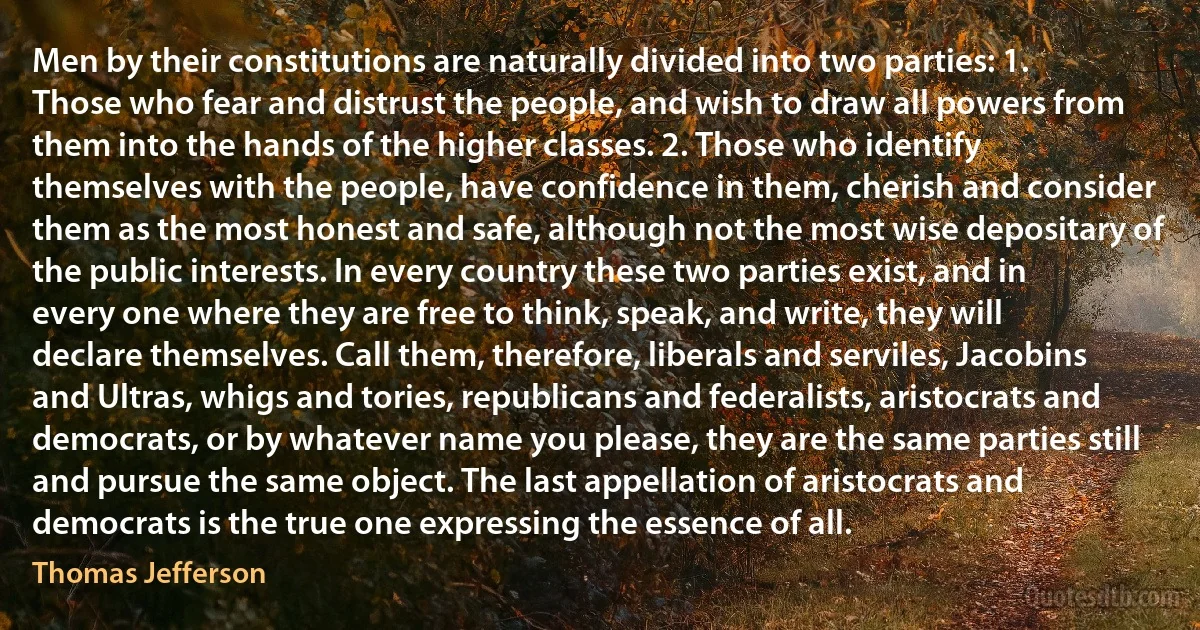
Men by their constitutions are naturally divided into two parties: 1. Those who fear and distrust the people, and wish to draw all powers from them into the hands of the higher classes. 2. Those who identify themselves with the people, have confidence in them, cherish and consider them as the most honest and safe, although not the most wise depositary of the public interests. In every country these two parties exist, and in every one where they are free to think, speak, and write, they will declare themselves. Call them, therefore, liberals and serviles, Jacobins and Ultras, whigs and tories, republicans and federalists, aristocrats and democrats, or by whatever name you please, they are the same parties still and pursue the same object. The last appellation of aristocrats and democrats is the true one expressing the essence of all.
Thomas JeffersonRelated topics
appellation call confidence country draw fear free men last name people public safe speak think tories whatever wise wish write hands higher whigsRelated quotes
This trendy, new crowd, which likes to do everything with committees, really believes that all it takes to make anything legal and OK is a majority. I guess they call that democracy. When the majority is what it has become in the United States today, a better name is mobocracy. But really, it's much worse than mob rule. It is rule by a self-appointed elite of utterly evil and destructive people who have in their hands the tools for controlling and guiding the mob. They're pretty cocky now -- so cocky, in fact, that they're making statements of the sort I've quoted today. They're cocky because they believe that no one can take away from them their tools for controlling the mob, and that as time passes and America becomes darker and more degenerate, their grip on the mob will only become firmer. Our job is to prove them wrong. It's a big job, and we'd better get started.

William Luther Pierce
Reputation runs in a vicious circle, and Merit limps behind it, mortified and abashed at its own insignificance. It has been said that the test of fame or popularity is to consider the number of times your name is repeated by others ... So, if you see the same name staring you in the face in great letters at the corner of every street, you involuntarily think the owner of it must be a great man to occupy so large a space in the eye of the town. The appeal is made, in the first instance, to the senses, but it sinks below the surface into the mind. There are various ways of playing one's-self off before the public, and keeping one's name alive. The newspapers, the lamp-posts, the walls of empty houses, the shutters of windows, the blank covers of magazines and reviews, are open to every one.

William Hazlitt
I see those pretended politicians who place all their subtlety, and who think they serve their country best, in circumventing those with whom they treat, interpreting the conditions of a treaty in such a manner, that all the advantage results to their own country. Far from blushing at conduct so contrary to equity, to right, and to national honesty, they boast of their dexterity, and pretend that they deserve the name of great negociators. How long shall public men boast of conduct which would disgrace a private individual? ...Shall powerful states abandon openly that which is honest, for that which may appear useful? It often happens for the happiness of the human race, that this pretended utility is fatal to the powers who follow it, and that, even among sovereigns, candour and right are found to be the safest policy.

Henry Temple, 3rd Viscount Palmerston
We owe it, therefore, to candor and to the amicable relations existing between the United States and those powers to declare that we should consider any attempt on their part to extend their system to any portion of this hemisphere as dangerous to our peace and safety. With the existing colonies or dependencies of any European power we have not interfered and shall not interfere. But with the Governments who have declared their independence and maintain it, and whose independence we have, on great consideration and on just principles, acknowledged, we could not view any interposition for the purpose of oppressing them, or controlling in any other manner their destiny, by any European power in any other light than as the manifestation of an unfriendly disposition toward the United States.

James Monroe
You know, we can't be so fixated on our desire to preserve the rights of ordinary Americans to legitimately own handguns and rifles -- it's something I strongly support -- we can't be so fixated on that that we are unable to think about the reality of life that millions of Americans face on streets that are unsafe, under conditions that no other nation-no other nations-has permitted to exist. And at some point, I still hope that the leadership of the National Rifle Association will go back to doing what it did when I was a boy and which made me want to be a lifetime member because they put out valuable information about hunting and marksmanship and safe use of guns. But just to know of the conditions we face today in a lot of our cities and other places in this country and the enormous threat to public safety is amazing.

Bill Clinton
